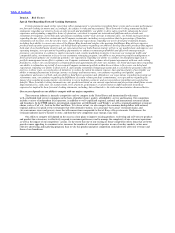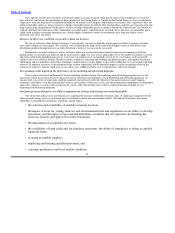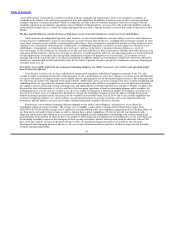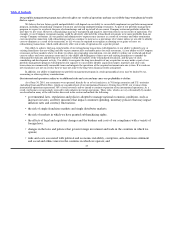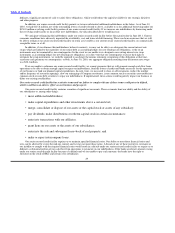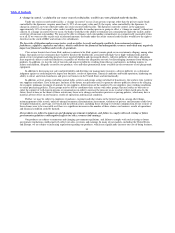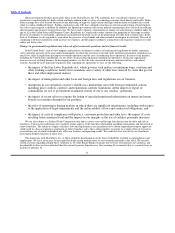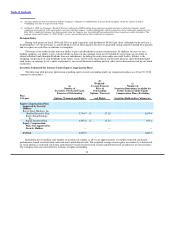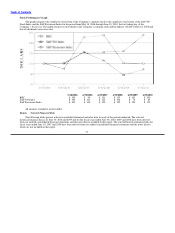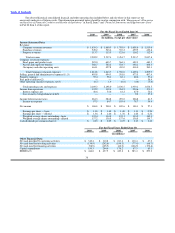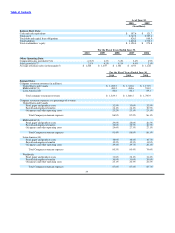Burger King 2010 Annual Report Download - page 31
Download and view the complete annual report
Please find page 31 of the 2010 Burger King annual report below. You can navigate through the pages in the report by either clicking on the pages listed below, or by using the keyword search tool below to find specific information within the annual report.
Table of Contents
dedicate a significant amount of cash to satisfy these obligations, which would reduce the capital available for our strategic initiatives
and other purposes.
In addition, our senior secured credit facility permits us to incur substantial additional indebtedness in the future. As of June 30,
2010, we had $115.8 million, net of the outstanding letters of credit referred to above, available to us for additional borrowing under our
$150.0 million revolving credit facility portion of our senior secured credit facility. If we increase our indebtedness by borrowing under
the revolving credit facility or incur other new indebtedness, the risks described above would increase.
We anticipate refinancing the indebtedness under our senior secured credit facility before the maturity date in June 2011. Current
economic conditions have adversely impacted the availability, cost and terms of debt financing. There can be no assurance that we will
be able to refinance our senior secured credit facility on terms as favorable as our current senior secured credit facility, on commercially
acceptable terms, or at all.
In addition, if we refinance this indebtedness before its maturity, we may not be able to re−designate the current interest rate
swaps which are linked to the maturities of our senior debt as accounting hedges for new floating rate obligations, or the swap
instruments may be terminated by our counterparties. In the event we are unable to re−designate our existing interest rate swap
instruments as accounting hedges for new floating rate obligations, or in the event that our counterparties exercise their right to
terminate the swap instruments, we could be required to accelerate the income statement recognition of this obligation at that time,
accelerate cash payments to counterparties, or both. At June 30, 2010, our aggregate obligation resulting from the interest rate swaps
was $26.1 million.
If we are unable to refinance our senior secured credit facility, we cannot guarantee that we will generate enough cash flow from
operations or be able to obtain enough capital to repay our indebtedness, fund the letters of credit and bonds necessary for the operation
of our business or fund our planned capital expenditures. In such event, we may need to close or sell restaurants, reduce the number
and/or frequency of restaurant openings, slow our reimaging of Company restaurants, issue common stock or securities convertible into
common stock or issue debt securities to repay our indebtedness. If implemented, these actions could negatively impact our business or
dilute our existing stockholders.
Our senior secured credit facility has restrictive terms and our failure to comply with any of these terms could put us in default,
which would have an adverse effect on our business and prospects.
Our senior secured credit facility contains a number of significant covenants. These covenants limit our ability and the ability of
our subsidiaries to, among other things:
• incur additional indebtedness;
• make capital expenditures and other investments above a certain level;
• merge, consolidate or dispose of our assets or the capital stock or assets of any subsidiary;
• pay dividends, make distributions or redeem capital stock in certain circumstances;
• enter into transactions with our affiliates;
• grant liens on our assets or the assets of our subsidiaries;
• enter into the sale and subsequent lease−back of real property; and
• make or repay intercompany loans.
Our senior secured credit facility requires us to maintain specified financial ratios. Our ability to meet these financial ratios and
tests can be affected by events beyond our control, and we may not meet those ratios. A breach of any of these restrictive covenants or
our inability to comply with the required financial ratios would result in a default under our senior secured credit facility or require us to
dedicate a substantial portion of our cash flow from operations to payments on our indebtedness. If the banks accelerate amounts owing
under our senior secured credit facility because of a default and we are unable to pay such amounts, the banks have the right to
foreclose on the stock of BKC and certain of its subsidiaries.
29


